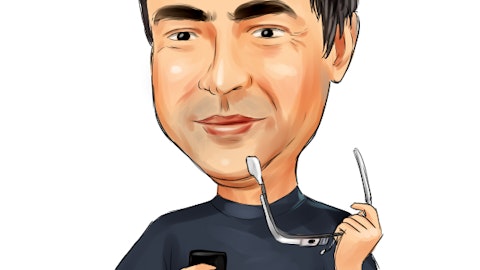Facebook Inc (NASDAQ:FB) has plummeted since its IPO, down over 50%. The largest fund owners in Facebook at the end of June were two “tiger cubs.” Tiger Global owned 2 million shares and Tiger Consumer owned 1.6 million. Since the end of 2Q, Facebook is down almost 40%—over $12 per share. Assuming the funds continue to own the same number of shares as at the end of 2Q, Tiger Global has lost over $24 million and Tiger Consumer $19.2 million—check out all the funds owning Facebook. Other notable investors getting into Facebook Inc (NASDAQ:FB) during 2Q and subsequently losing large sums of money were George Soros and Steven Cohen.
The two tiger cubs also had notable ownership in a couple other top tech stocks: Apple Inc. (NASDAQ:AAPL) and Google Inc (NASDAQ:GOOG). Although Facebook Inc (NASDAQ:FB) might be a sour pick for the tiger cubs, Google has turned out to be a positive bet. Google is down around 8% this week on poor earnings, but is still up over 28% since the end of 2Q. Tiger Consumer owned 166,000 shares of Google and Tiger Global owned 900,000 at the end of last quarter. Assuming they have not sold any of their positions, both funds have more than made up for their Facebook losses via Google. Tiger Global may be up as much as $144 million on its Google investment and Tiger Consumer as much as $26 million.
A positive note for Facebook Inc (NASDAQ:FB) has been that Google’s social network, Google Plus, still struggles to gain traction in the social networking market. As well, Apple recently shut down its social network Ping. Apple was Tiger Global’s top 2Q 13F holding. The firm now has almost 14% of its 13F portfolio invested in Apple. We are confident that Tiger Global is not betting on Apple for its social network however. Ping was Apple’s attempt to integrate a social aspect into music and was embedded in the company’s iTunes software. Apple will now rely on its standalone music software and stand by as Facebook makes an attempt to make music social. Although we see social listening as a feature that could bring more traffic to Facebook Inc (NASDAQ:FB), we still have our doubts that this will solve their monetization issues.
While the top two tiger cub funds have offset their Facebook Inc. (NASDAQ:FB) loses in other areas, the question is whether they see any reason to still own the social network or whether have any conviction to buy more. Facebook is currently trading around its lowest price, $18.80, since becoming a public company. The issues reiterated over and over again include Facebook’s inability to monetize mobile. The network’s number of mobile users is up to 57% of its total base, but the amount of revenue derived from mobile continues to be negligent. As well, even though the company has reached the 1 billion user mark, its valuation cannot stand on users alone, as eyeballs do not always translate into revenues. This is especially important as Facebook Inc (NASDAQ:FB) begins to mature, seeing user growth decline from 12% in 1Q to 6% in 2Q.
Zynga Inc (NASDAQ:ZNGA) the game developer that launches and runs games within Facebook recently lowered its 2012 bookings forecast in its 3Q earnings announcement. Zynga is one of Facebook’s largest customers and the shift to mobile is also having a negative impact on the gaming company. The lowered full year booking forecast sees bookings down 8% for the year. Facebook’s Payment business, which is 15% of its revenues, is made up of primarily of fees paid by Zynga. The social game has been similarly unsuccessful in the stock market as Facebook Inc (NASDAQ:FB), being down 75% since its December 2011 IPO.
Although the Facebook Inc (NASDAQ:FB) investment might not have worked out for the tiger cubs so far, Tiger Global Management also took a chance on the social network Linkedin Corporation (NYSE:LNKD). Tiger Global upped its 1Q stake by over 1,000% to become the top fund owner by shares in 2Q. Owning over 3.3 million shares, Tiger Global had almost 6% of their 2Q 13F portfolio invested in the “businessman’s version of Facebook.” Luckily the firm did not see quite the decline in stock price in LinkedIn as it did in Facebook Inc (NASDAQ:FB), as LinkedIn is trading relatively flat since the end of 2Q.
When comparing Facebook to its chief competitor, LinkedIn, the company’s valuation does not look as intimidating. Facebook Inc (NASDAQ:FB) trades at a forward P/E of 30, while LinkedIn is at 85. However, LinkedIn is expected to grow at an impressive five-year annual growth rate of 55%. The insider sentiment is bullish for Facebook, compared to mixed sentiment for LinkedIn, yet our fundamental concern remains actually being able to maintain a 25% plus annual growth rate over the next five years. We remain cautious on both companies and would like to see better monetization results from Facebook Inc (NASDAQ:FB) and continued initiatives by LinkedIn to support growth.






